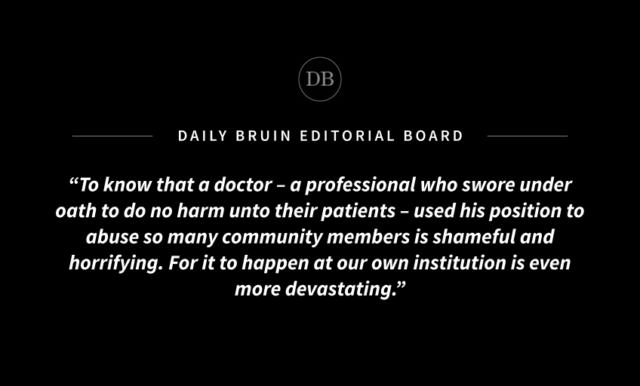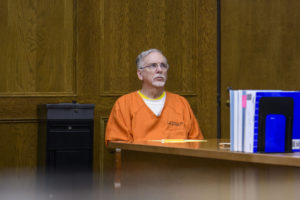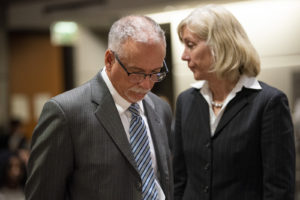This post was updated Nov. 14 at 8:58 p.m.
Accountability and closure are not high standards, but they are unfortunately not common enough when institutions are charged with holding sexual predators responsible for their alleged misdeeds.
This month, a judge granted the prosecution a retrial for nine hung counts remaining against former UCLA gynecologist James Heaps. Heaps had already been sentenced to 11 years in prison on charges of sexual battery by fraud and sexual exploitation of an unconscious victim after being found guilty on those counts last year.
Heaps had worked at UCLA for nearly 30 years as a UCLA Health gynecologist and a David Geffen School of Medicine faculty member until 2018. More than 500 lawsuits have been filed against Heaps and UCLA, and the UC has paid out nearly $700 million in settlements.
Plaintiffs accused the university of failing to protect patients despite being aware of Heaps’ misconduct.
To know that a doctor – a professional who swore under oath to do no harm unto their patients – used his position to abuse so many community members is shameful and horrifying. For it to happen at our own institution is even more devastating.
The judge’s decision to allow the Los Angeles County District Attorney’s office to pursue a retrial for the remaining undecided counts represents a fair step toward justice for the victims. But the reason this decision seems like such a victory is because of a history of failure in holding perpetrators of sexual misconduct accountable.
Prosecuting attorney Danette Meyers mentioned during the Nov. 3 hearing that it was important it was for the victims to receive closure because no one wanted to see “another Tyndall situation.”
George Tyndall, a former gynecologist at the University of Southern California, was expected to face a criminal trial next year after being accused of sexually abusing hundreds of patients. Last month, however, he was found dead in his home, leaving victims without resolution.
Like with Heaps, it took years for Tyndall’s actions to come to light and for the former gynecologist to face the limited consequences he did. In 2016, a nurse complained about him to the USC rape crisis center, but Tyndall was only suspended before eventually retiring, according to The New York Times. USC did not immediately report the findings of its internal investigation to the state medical board.
But even if USC had reported its findings, a Los Angeles Times investigation found that the state medical board has a history of allowing doctors accused of sexual misconduct to regain their licenses. The LA Times found that more than half of sexual abusers requesting to regain their license were reinstated by the board – a far greater percentage than doctors who had lost their license for all other reasons.
This was, and arguably still is, the status quo when it comes to holding those with influence accountable for their wrongdoings. The handling of Heaps’ case endured a similar lack of due process. UCLA took more than a year to notify the public that the former university doctor was under investigation, despite the clear implications for student safety and well-being.
Granting the retrial of the remaining counts against Heaps is a welcome step toward accountability – but one that should not come as such a surprise. It is simply the system working as it was intended – to ensure both sides receive finality and justice is served.
A retrial does not ensure Heaps will be found guilty of his remaining nine charges, nor does it change the past and reverse the trauma inflicted upon Heaps’ hundreds of patients.
Rather, it raises public awareness about sexual misconduct by medical providers and creates an opportunity to reestablish trust in the systems that have failed far too many victims before.






Comments are closed.